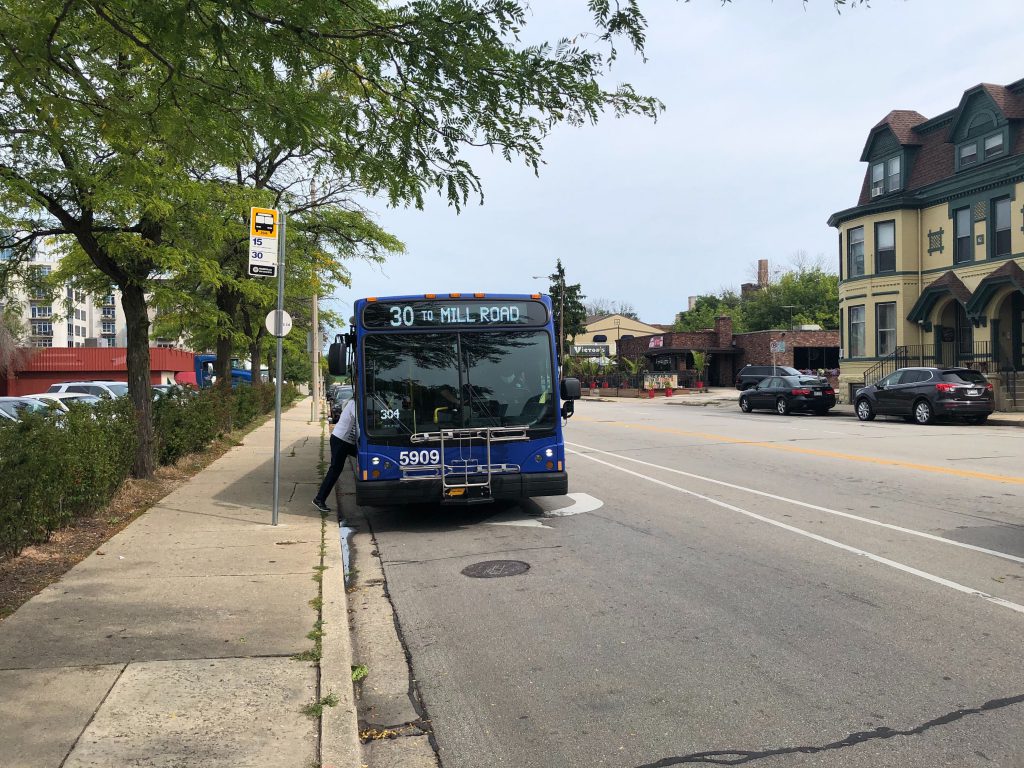MCTS Bus Drivers Authorize A Strike
MCTS and union reach impasse over wages, healthcare. Union gives leadership authority to call a strike.
Contract negotiations between the union representing transit workers and the Milwaukee County Transit System (MCTS) are stuck, and now members have voted to give union leaders the authority to call a strike.
Leadership of Amalgamated Transit Union Local 998 (ATU) told Urban Milwaukee that negotiations over a new three-year contract recently reached an impasse over wages and health care. But union leaders explained that what they’re holding out for in the contract is important to addressing the ongoing problem MCTS has with employee retention.
MCTS has struggled to retain workers for years, but this problem became even more acute in recent years as festival and Freeway Flyer service was eliminated because there weren’t enough workers to staff them. In 2021, MCTS missed 7,487.2 planned service hours, or 0.56% of budgeted service, because it didn’t have enough operators run the service it was budgeted for.
In this sense, Shorter said, the contract is really about asking MCTS and county leaders, “Do we want to shrink the system? Or do we want to try and maintain what we have.”
The transit system has invested in employment marketing, hiring bonuses ($1,000 for new operators) and added training classes. But it loses workers just as fast as it hires them. In 2021, the transit system hired more than 130 operators, but by the beginning of this year, it had roughly the same number of operators as it did early in 2021. “Our issue isn’t hiring workers… we’ve hired hundreds of workers,” Shorter said.
“That wage isn’t saying that we’re greedy,” Shorter said. “That wage is saying that we need someone else to join our team and take the pressure off of us.”
Shorter said short staffing is making a difficult job more stressful. “It’s a really tough job, you know, if this job wasn’t tough we wouldn’t have a problem retaining workers,” Shorter said.
With fewer workers, and increasingly fewer buses in the fleet, Shorter said run times are getting faster in order to maintain service frequency within a system that is shrinking. There were 400 buses in the fleet in 2018. By 2023, it’s budgeted to have 314. “So you’re asking more out of us than any other transit system,” he said. “And we really feel that that’s how they balanced the budget for many years — off the backs of the operators.”
MCTS recently redesigned the entire route network, balancing it toward a system with more high-frequency routes. This was a cost-neutral redesign moving service around, and in some cases eliminating routes, to increase bus frequency.
There have been, however, some concessions by the company on an issue that affects bus operators’ work-life balance: split shifts. A split shift separates a single workday into two separate work periods. Under the current contract, MCTS can hold an operator on a split shift for up to 18 hours in a single day. The union and MCTs have agreed on a reduction to 14 hours. “We’ve tackled stuff in this contract we haven’t tackled in 30 years,” he said.
Shorter said the union and MCTS have already begun scheduling dates to resume negotiations. But he said the strike vote taken by the workers is serious — 93% of the union voted in favor of authorizing a strike. “Employees are burned out, tired — that percentage shows that,” Shorter said.
In a statement, a spokesperson for MCTS said: “We are proud of our employees and the work that they do. Every three years, we enter into contract negotiations with ATU Local 998, these negotiations began earlier this year. MCTS has made what we believe to be a fair offer that includes minimal healthcare changes and up to a 9 percent wage increase over the three-year period. We also have worked hard to improve the work life balance and safety of our employees. The local ATU took a yes/no vote on the offer on Friday. They voted no. Negotiations will continue in November.”
If you think stories like this are important, become a member of Urban Milwaukee and help support real, independent journalism. Plus you get some cool added benefits.
MKE County
-
New Report Shows Lower Deficit for 2025 Budget
 Apr 23rd, 2025 by Caleb Rose
Apr 23rd, 2025 by Caleb Rose
-
Anonymous Donor Will Fund Boat Removal
 Apr 23rd, 2025 by Graham Kilmer
Apr 23rd, 2025 by Graham Kilmer
-
Coalition Pushes For Early Childhood Funding
 Apr 23rd, 2025 by Graham Kilmer
Apr 23rd, 2025 by Graham Kilmer
Transportation
-
Supervisors Nix Uber Rides for Bus Drivers
 Apr 17th, 2025 by Graham Kilmer
Apr 17th, 2025 by Graham Kilmer
-
International Terminal Construction Could Begin This Year
 Apr 17th, 2025 by Graham Kilmer
Apr 17th, 2025 by Graham Kilmer
-
Spirit Adds Non-Stop Flights To Detroit
 Apr 16th, 2025 by Graham Kilmer
Apr 16th, 2025 by Graham Kilmer























Even though I’m retired and own a car, I ride the bus when it’s convenient, as it often is in this neighborhood. I support the drivers right to strike, and hope the threat of it will move the negotiations forward. I’ve seen first hand what a stressful job it is.